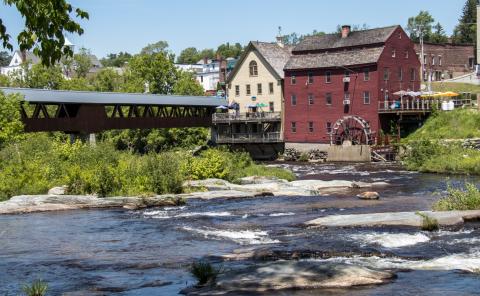Innovation and Entrepreneurship: The Keys to Community Resilience

For centuries, communities across New England and New Hampshire have undergone dramatic changes resulting from a slate of forces, from the introduction of new technologies to the advent of natural disasters and economic downturns. In spite of these and other disruptive changes, countless communities in the region have demonstrated their resilience time and time again by bouncing back from adversity and capitalizing on opportunity.
A key attribute that has helped such communities overcome adversity is their ability to innovate and adapt to change. The term “innovation” refers to the introduction of a new idea, method, technology, or system that adds economic or social value to the people, institutions, organizations, or businesses residing in a place, such as a city, town, or region. In essence, resilient communities—those that successfully adapt to change—all leverage assets and resources in innovative ways that enable them to tackle problems and capitalize on opportunities. Without innovation, communities are less able to adapt to socioeconomic forces of change or disruptive events and shocks, such as the loss of an industry or a natural disaster.
A second attribute of resilient, adaptive communities is that they are entrepreneurial. Not only do they maintain people willing to convert their ideas and vision into enterprises, but they also maintain the systems and processes necessary for fostering entrepreneurship In addition to physical infrastructures such as incubators and high-speed internet, they also focus on “soft” infrastructures that are needed to support entrepreneurship: educational institutions that teach problem solving, supportive local government that create effective policies, engaged community volunteers that improve the community and support local business, and well-networked support institutions and organizations who coordinate education, technical assistance, financing, mentoring, and networking.
Take Manchester, the epitome of an entrepreneurial city that has had to continually reinvent itself in order to sustain and grow its economy. By the late 1800s, Manchester had leveraged its prime location on the Merrimack River to drive a thriving textile industry, which helped the city emerge as an economic powerhouse in the region. This prosperity lasted for over half a century, until the Great Depression and the great flood of 1939 forced the mills into bankruptcy. But the mills were able to bounce back in the 1940s and 50s by adapting to new uses. Today, the mills continue to thrive with emerging technology and biotechnology enterprises, such as Autodesk, Deka, and the Advanced Regenerative Manufacturing Institute (ARMI), a U.S. Department of Defense-funded project focused on organ and tissue regeneration research. The city has had its fair share of ups and downs, but it has always managed to find a way to move forward.
Littleton, New Hampshire is another example of a town that has managed to reinvent itself. Littleton first emerged as a thriving industrial town by the late 1700s, with around ten mills setting up along the banks of the Ammonoosuc River. By the late 1800s, the railroad had made its way up to Littleton, making it a center of commerce. Once dubbed “The Crossroads of New England”, Littleton drew tourists from afar to the region’s Grand Resort Hotels, while the timber barons thrived because of their newfound ability to transport logs. While the timber industry eventually went into decline, the town has been able to capitalize on its historic character and prime location in the heart of the White Mountains to draw people. Today, a major draw is the town's thriving Main Street, filled with shops and galleries, art installations, restaurants and brew pubs.
Characteristics of Innovative and Entrepreneurial Communities
While not all communities are innovative and entrepreneurial like Manchester and Littleton, all have assets that can be identified and nurtured, and perhaps developed into a legitimate and coherent strategy for local and regional economic development. It is helpful to think of these entrepreneurial and innovative qualities and characteristics along a continuum of increasing awareness and commitment to entrepreneurial capacity as part of the community’s strategy to redefine and transform itself. Those characteristics include:
- Capacity and willingness to work together on community goals
- Leadership that can be mobilized for organizing community efforts
- Agreement that a difference can be made in the community that will impact its economic future
- Existence of entrepreneurs and potential entrepreneurs in the community
- Business friendly environment that encourages new business starts and that allows business expansion with a minimum of red tape and bureaucracy
- Nourishment of entrepreneurial activity through civic recognition and support
- Business and entrepreneurial development including training, mentors, networks and other resources available for existing and potential entrepreneurs
- Financing support through community, regional and local investor resources
- Local and regional networks for business growth and expansion and for specialized assistance in such areas as marketing and international trade
- Civic entrepreneurship that redefines and transforms the community’s business culture
The point is, it is not by accident that New Hampshire’s cities and towns have been able to adapt and thrive following adversity or change. Rather, it is their ability to intentionally act to leverage resources, come together and build connections, foster innovative solutions to problems, and cultivate and support entrepreneurs that create vibrancy and help drive the local economy.